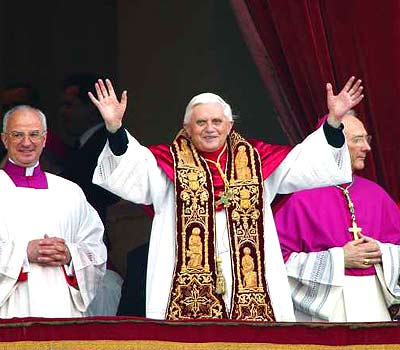“To have a correct view of the rules adopted and applied to Indian affairs when grants were issued by the kings of England for lands in North America,” Haywood wrote, “we must look to the prevailing opinions in those days in matters of religion. The spiritual fathers of Christendom [the popes] dictated the creed of the people, and assumed enormous powers. …”
The pope’s “grants of infidel countries were considered binding in heaven, and of course upon the consciences of Christians,” wrote Haywood. What was the thinking behind such grants? Haywood pointed to Calvin’s Case (1608), in which Lord Edward Coke held that “all infidels are in law ‘perpetual enemies’; for between them, as with the devils [sic] whose subjects they be, and the Christian, there is perpetual hostility.”
At the time of Calvin’s Case, said Haywood, the “old law of nations” had not been “superseded by the modern [law of nations], so far as regarded their conduct toward infidel countries.” He continued: “The same view and practices had been exhibited by all the nations of antiquity; the Babylonians, the Persians, Greeks, and Romans, and by the Israelites under the Guidance of Moses and Joshua. According to what it [the law of nations] permitted, they extirpated [uprooted] the inhabitants of the countries they invaded, driving them from their habitations, or killing and enslaving them, as best suited their present circumstances.”
The "nations of antiquity" also had laws sanctioning the divine right of kings, slavery and serfdom, and women as chattel. Should the US uphold these old laws because they were valid once? I don't think so.
Many conservatives today are up in arms because US judges occasionally cite examples (not precedents) in international law. If these conservatives were consistent, they'd denounce the US court decisions based on the papal Doctrine of Discovery. They'd argue for overturning these decisions and upholding tribal sovereignty.
Instead, they're likely to claim these court decisions go too far. That tribal sovereignty is a fiction and tribes are subject to federal and state control. So much for the intellectual integrity of conservatives.
For more on the subject, see Episcopal Church Repudiates Doctrine of Discovery and Those Evil Europeans.


11 comments:
KKKonservatives are among the worst oppressors of Indigenous peoples of Americas. I was born and raised a Christian myself. But as I grew older(into my 20's) I then began to realize some of the hypocritical views on Indigenous peoples portrayed by white Christians. The historical events to the present day, I didn't like what I was reading and hearing. I remembered reading about the Pope's controversial speech in Latin America, in which he implied that Indigenous peoples were hungry for the Christian faith, after the arrival of Columbus. I thought that remark was totally B.S. And its a shame, that even those in the highest authority within the church can be biased and stereotypical of Natives.
Which is why I have grown distant from the Christian faith.
The pope is the highest official in one sect of Christianity. He is not the leader of "the church" as a whole.
The pope was the leader of Christianity as a whole when he issued his papal bulls and grants.
More than half the world's Christians are Roman Catholics, I think. References to "the church" often mean the Catholic Church.
I was referring to the pope seen in the picture :)
Not to forget that "the church" the Pope represents, is one of the mainstream Chrstian sects--Catholic. Other so called sub-Christian sects such as "ministries" and such are more of a cult, that does not represent "the church" as a whole. And I'm sure everyone knew exactly what I talking about when referring to "the church".
GENO--
When referring to the "Christian faith" as a whole, as the first Anon did, "the church" implies all sects, not just the RCC.
As for Rob's statement,
"The pope was the leader of Christianity as a whole when he issued his papal bulls and grants.", it all depends upon which Papal Bulls he is referring to.
At the time of the onerous and New World-specific Papal Bull of 1493, the Great Schism was ancient history.
Well the "first Anon" was me. And I made note of the Pope's speech, by mentioning "the Pope". No other Christian church uses the papal term--the Pope. And my first comment about "the church" referred to the Catholic church.
Go figure....
GENO--
O-KKK.
I'm not sure any other Christian church has ever challenged the Roman Catholic Church for leadership of Christianity as a whole. Not successfully, anyway. Numerically speaking, the pope has always held sway over the majority of Christians.
In other words, "as a whole" was another of my generalizations. I didn't mean to say the Catholic Church literally ruled over every Christian. Clearly it didn't.
The non-Catholic sects just don't recognize the Pope at all as the "leader of Christianity",
Even if there has been no serious "challenge" to set up a non-Catholic leader as the ruler of all Christianity.
The Catholic majority (which isn't even a sure thing) clearly doesn't mean anything like "all". The exceptions aren't even rare: the Eastern Orthodox Church (estimated to number between 225 and 300 million members) and Protestants (800 million) are quite significant.
According to the Wikipedia totals for these divisions, and their statement that the Roman Catholic Church "and claims over a billion members, representing approximately half of all Christians", the Catholic share might not even be a majority.
The Catholic share is usually given as 1.1 billion or 1.2 billion. The total of Protestant plus Eastern Orthodox is given at about 1.1 billion.
Post a Comment